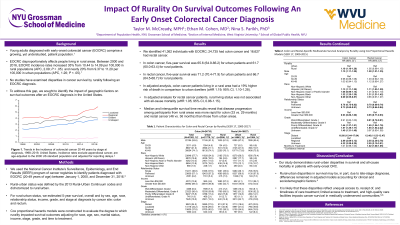Monday Poster Session
Category: Colorectal Cancer Prevention
P1771 - Impact of Rurality on Survival Outcomes Following an Early Onset Colorectal Cancer Diagnosis
Monday, October 23, 2023
10:30 AM - 4:15 PM PT
Location: Exhibit Hall

Has Audio

Taylor McCready, MPH
New York University School of Medicine
New York, NY
Presenting Author(s)
Taylor McCready, MPH1, Ethan M.. Cohen, MD2
1New York University School of Medicine, New York, NY; 2West Virginia University School of Medicine, Morgantown, WV
Introduction: The incidence of colorectal cancer among those under the age of 50, known as early-onset colorectal cancer (EOCRC), is increasing in the United States, despite decreasing incidence rates above 50 years of age. The impact of geographic factors on colorectal (CRC) outcomes are well defined in individuals over the age of 50, but not as well understood in EOCRC. This analysis sought to identify the impact of geographic factors on survival outcomes after an EOCRC diagnosis.
Methods: We used the National Cancer Institute’s Surveillance, Epidemiology, and End Results (SEER) program of cancer registries to identify patients diagnosed with EOCRC (20–49 years of age) between January 1, 2000, and December 31, 2016. The impact of rural-urban status, clinical, and sociodemographic variables were tested by cancer site: colon and rectum. Rural-urban status was defined by the 2013 Rural-Urban Continuum codes. Cox proportional hazards models were constructed to evaluate the degree to which rurality impacted survival outcomes adjusting for race, age, sex, marital status, income, stage, grade, and time to treatment.
Results: Among 46,856 individuals with EOCRC (24837 [53.01] male; 26967 non-Hispanic White individuals [57.6]), 28188 had colon cancer and 18668 had rectum cancer. Median and interquartile survival time results reveal that disease progression among participants from rural areas was more rapid for colon (33 vs. 29 months) and rectum cancer (46 vs. 36 months) than those from urban areas. On cox regression (Table 2), after adjustment for all covariates, colon cancer patients living in a rural area had a 10% higher risk of death in comparison to urban dwellers (HR 1.10; 95% CI 1.03-1.18). Rectum cancer patients living in a rural area had a 16% increased risk in the unadjusted analysis, but was no longer significant after adjustment.
Discussion: Among individuals with EOCRC, rural residents with colon cancer experienced an accelerated rate of disease progression and death when compared to urban residents.
Disclosures:
Taylor McCready, MPH1, Ethan M.. Cohen, MD2. P1771 - Impact of Rurality on Survival Outcomes Following an Early Onset Colorectal Cancer Diagnosis, ACG 2023 Annual Scientific Meeting Abstracts. Vancouver, BC, Canada: American College of Gastroenterology.
1New York University School of Medicine, New York, NY; 2West Virginia University School of Medicine, Morgantown, WV
Introduction: The incidence of colorectal cancer among those under the age of 50, known as early-onset colorectal cancer (EOCRC), is increasing in the United States, despite decreasing incidence rates above 50 years of age. The impact of geographic factors on colorectal (CRC) outcomes are well defined in individuals over the age of 50, but not as well understood in EOCRC. This analysis sought to identify the impact of geographic factors on survival outcomes after an EOCRC diagnosis.
Methods: We used the National Cancer Institute’s Surveillance, Epidemiology, and End Results (SEER) program of cancer registries to identify patients diagnosed with EOCRC (20–49 years of age) between January 1, 2000, and December 31, 2016. The impact of rural-urban status, clinical, and sociodemographic variables were tested by cancer site: colon and rectum. Rural-urban status was defined by the 2013 Rural-Urban Continuum codes. Cox proportional hazards models were constructed to evaluate the degree to which rurality impacted survival outcomes adjusting for race, age, sex, marital status, income, stage, grade, and time to treatment.
Results: Among 46,856 individuals with EOCRC (24837 [53.01] male; 26967 non-Hispanic White individuals [57.6]), 28188 had colon cancer and 18668 had rectum cancer. Median and interquartile survival time results reveal that disease progression among participants from rural areas was more rapid for colon (33 vs. 29 months) and rectum cancer (46 vs. 36 months) than those from urban areas. On cox regression (Table 2), after adjustment for all covariates, colon cancer patients living in a rural area had a 10% higher risk of death in comparison to urban dwellers (HR 1.10; 95% CI 1.03-1.18). Rectum cancer patients living in a rural area had a 16% increased risk in the unadjusted analysis, but was no longer significant after adjustment.
Discussion: Among individuals with EOCRC, rural residents with colon cancer experienced an accelerated rate of disease progression and death when compared to urban residents.
Disclosures:
Taylor McCready indicated no relevant financial relationships.
Ethan Cohen indicated no relevant financial relationships.
Taylor McCready, MPH1, Ethan M.. Cohen, MD2. P1771 - Impact of Rurality on Survival Outcomes Following an Early Onset Colorectal Cancer Diagnosis, ACG 2023 Annual Scientific Meeting Abstracts. Vancouver, BC, Canada: American College of Gastroenterology.
